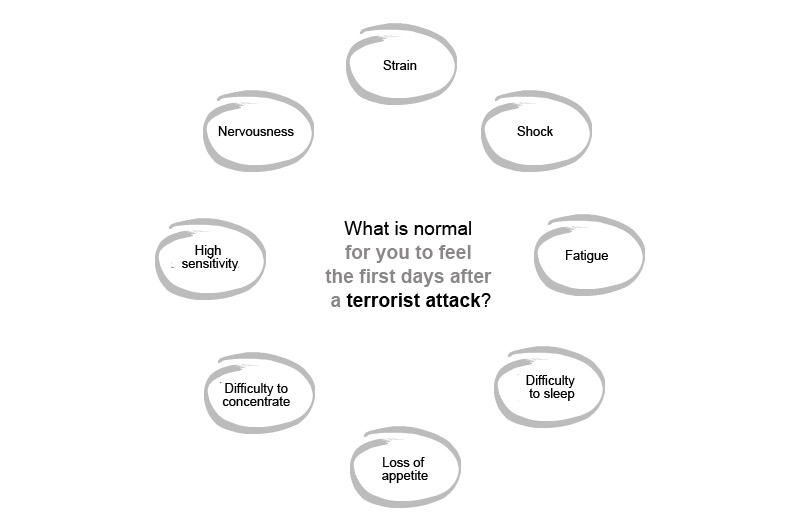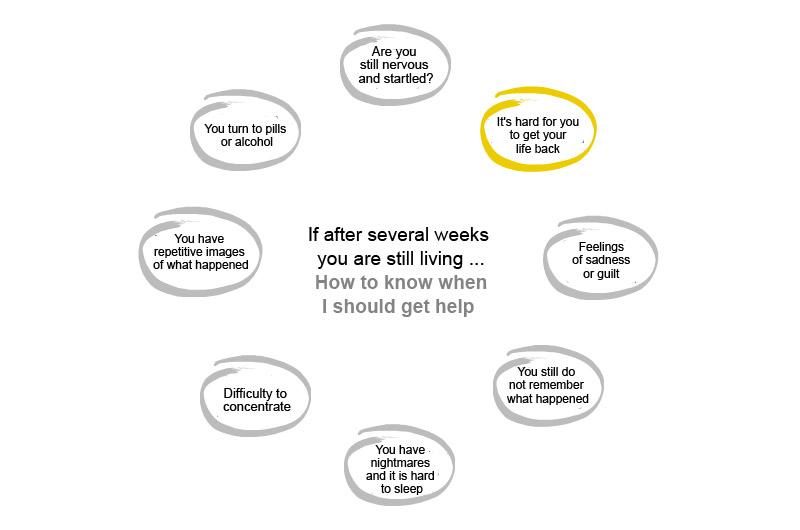POST-TRAUMATIC PSYCHOLOGICAL CARE
Psychological care is a professional resource for emotional and psychological well-being. This attention is dedicated to children, adolescents and adults who have lived or witnessed a situation of special emotional impact, in this case, an attack or terrorist act.
The psychology that specializes in crisis and primary care is fundamental for the correct readjustment after an experience of strong emotional impact. So well, after this first episode we can continue to experience emotional and physical discomfort. Sometimes, the post-traumatic symptomatology appears days, weeks or even months after the shocking event: we begin to have nightmares, anxiety, fears, develop phobias, etc. that require specialized intervention by mental health professionals.
When will I need psychological attention?
The UAVAT is a unit of experts in care, recovery and comprehensive assessment of victims and affected by terrorism.
What is normal for you to feel the first days after an attack?
“I think about what happened all the time, what I did. I feel very scared”
All of these are normal reactions to a not normal situation. Feelings of helplessness, fear, anxiety and sensitivity are common in the first days, even weeks, from a situation of strong emotional impact. Much of the usual symptomatology after traumatic situations disappears in the following days. Some of the resources that can help restore stability begin by asking for help, having the support of your family, couple and / or friends, paying attention to basic needs (food, sleep, hygiene, etc.), not staying alone and recovering little everyday habits. In the great majority of cases, all that psychological and emotional “reaction” will diminish until a stability is regained.

When to go see a psychologist?
“It’s hard for me to get back to my routine”
When, after a few weeks, we continue to feel intense emotional discomfort, in clinical language, we can start to talk about to acute symptoms.
These symptoms are composed by a set of sensations, physical manifestations or different thoughts, such as a feeling of detachment or emotional flattening, disorientation, difficulties to remember, recurrent and intrusive images, dreams and nightmares, avoidance of the place of events, feeling of hopelessness, difficulties concentrating, irritability or startles.
When all this prevents us from resuming our day to day, then its time to go to a specialist.

PSYCHOLOGICAL ATTENTION
The psychological attention to victims of attacks requires the knowledge and specialization in post-traumatic and dissociative psychology that come with stressful life experiences.
The UAVAT is composed as a unit of experts in psychiatry and child and youth psychology, adult, post-traumatic and forensic, aimed at providing comprehensive care and quality assessment.
In the UAVAT we have psychologists and psychiatrist experts in psychotherapy, brain integration techniques (ICT) and EMDR, crisis care and emotional support for both adult and child population.
The knowledge and clinical experience of the development, appearance and evolution of post-traumatic symptomatology, of the protective and vulnerability factors, as well as of the psychological, personal, social and family impact after a traumatic event are essential for an adequate treatment.
SELF-HELP AND DETECTION RESOURCES
CLINICAL COURSE OF THE POST-TRAUMATIC AFFECTATION
0
Traumatic fact
A general terrorist attack causes, in a greater or lesser degree, an emotional and psychological impact on the whole of society.
1
Immediate effect
Any person who has lived, witnessed or been aware of this traumatic event can develop an immediate effect.
2
Long term
When the symptoms persist and the psycho-emotional discomfort continues we talk about psychological injury.
3
Chronic
The psychic sequels refer to the chronification of the damage or psychological injury. The consequences generate a deterioration of personal, social, work and family functioning in people’s lives as well as a chronic impairment of mental and / or emotional health.
ACTIONS
Attention and immediate assessment
They are normal reactions to a not normal situation
Those reactions of pain, anxiety, sadness, etc. can coexist with factors of personal vulnerability.
They can last from 0 to 3 months
Specialized psychological treatment
Post-traumatic psychology has a high efficacy against trauma and its emotional injuries.
The presence of positive factors such as the maintenance of a psychological treatment, a family support, an emotional stability, a healthy life, etc. promote a positive evolution of patients with psychological injuries.
Psychological treatment and expert assessment
Before the chronification of sequels, a psychological support or monitoring and their forensic assessment will be necessary, mainly aimed at: Processes of work incapacitations, certification of disability and establishments of benefits and indemnities for compensation of damages.

